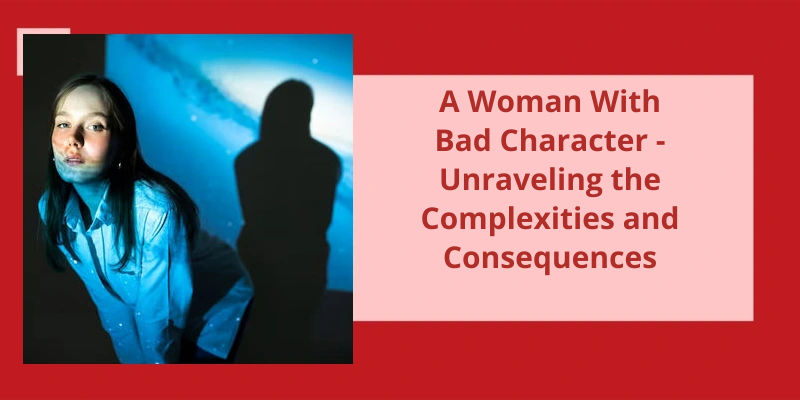This thought-provoking exploration uncovers the intricate layers that contribute to the development of her character, highlighting the intricate interplay between her actions, intentions, and the repercussions that follow. As readers embark on this gripping narrative, they’ll witness the unexpected twists and turns that shape this woman's destiny, challenging conventional notions of morality and leaving us pondering the complexities of human behavior. This compelling examination invites us to question our own preconceived notions about what it means to possess a "bad character" and ultimately invites us to empathize with the protagonist's turbulent journey of self-discovery and redemption.
What Makes Someone a Bad Character?
A woman with bad character can be someone who possesses a range of negative traits that have a significant impact on those around her. One of the key aspects that contribute to someone being considered as having bad character is their ability to turn the world and the story upside down. These individuals have a knack for creating chaos and making life difficult for the protagonists, whether it be through manipulation, deceit, or acts of cruelty.
Their behavior can damage relationships, both personal and professional, leading to a breakdown in trust and emotional turmoil. Additionally, their actions can disrupt the overall narrative, creating tension and conflict that may affect the outcomes and development of other characters.
Often, their negative behavior is indicative of deeper internal struggles and unhappiness. This can result in isolation, a loss of meaningful connections, and an overall dissatisfaction with life.
Unraveling the complexities and consequences of their actions requires a deep understanding of their motivations and the impacts of their behavior. Identifying and exploring these aspects provide insight into the intricate nature of character development and the ripple effects it can have on those around them.
When it comes to assessing character, there are certain signs that can indicate a person’s moral standing. Various traits form the building blocks of bad character, such as arrogance, cruelty, bad temperament, disagreeableness, a bossy attitude, and selfishness. These attributes not only reflect negatively on an individual’s character but can also impact their relationships and interactions with others. Recognizing these signs can be crucial in navigating personal and professional connections effectively.
What Are Some Signs of Bad Character?
When it comes to identifying signs of bad character, there are several key traits that can serve as red flags. One crucial indicator is arrogance – individuals with this trait often display an inflated sense of superiority and entitlement, looking down upon others with disdain. Another sign is cruelty, which manifests in the deliberate infliction of pain or suffering on others, either through physical or emotional means. Those with bad character often exhibit a consistently bad temperament, regularly losing their temper and displaying impatience or irritability.
Disagreeableness is another notable trait that characterizes individuals with bad character. They tend to be uncooperative, argumentative, and resistant to compromise, making it challenging to form healthy and productive relationships with them. Additionally, a bossy attitude is prevalent among those with bad character, as they’ve a strong inclination to control and dominate others. This behavior often manifests as being overly demanding, manipulative, or condescending.
Lastly, selfishness is a central trait that pervades bad character. Individuals with this quality prioritize their own needs above all else, frequently disregarding the well-being or feelings of others. Their actions are driven by self-interest rather than empathy or compassion, often resulting in negative consequences for those around them. These six traits – arrogance, cruelty, bad temperament, disagreeableness, bossy attitude, and selfishness – collectively form a complex and detrimental profile of bad character. Understanding and recognizing these signs is crucial in navigating relationships and minimizing the potential harm caused by individuals with such character flaws.
Dishonesty: Individuals With Bad Character May Exhibit a Pattern of Lying, Deception, or Manipulation.
- Individuals with bad character may exhibit a pattern of lying.
- Deception is another common trait found in individuals with bad character.
- Manipulation is often employed by those who’re dishonest.
A good female main character displays several characteristics that make her strong and compelling. Firstly, she’s her own opinions and isn’t afraid to voice them, making decisions that align with her own values. Secondly, she’s her own person, standing confidently in her own identity rather than being defined solely by her relationships or external circumstances. Thirdly, she’s flaws, making her relatable and multi-dimensional. Lastly, she possesses her own brand of toughness, whether it be physical, emotional, or intellectual, that adds depth to her character.
What Makes a Good Female Main Character?
A woman with bad character is a complex and intriguing subject, one that unravels the complexities and consequences of her actions. She isn’t your typical damsel in distress or one-dimensional character. Instead, she embodies strength, resilience, and an unyielding spirit. What makes her a good female main character? It’s in her distinct characteristics that set her apart and make her relatable to readers.
One crucial characteristic of a strong female lead is that she’s her own opinions. She isn’t easily swayed by others beliefs or societal expectations. Instead, she listens to her instincts and makes decisions based on her own value system. Even villains can have reasons for their choices, adding depth and complexity to their character.
She doesn’t define herself solely through her relationships or the roles she plays in the lives of others. Instead, she’s ambitions, dreams, and a sense of self that goes beyond societal expectations. She stands confidently on her own two feet, challenging stereotypes and breaking down barriers.
Furthermore, she’s flaws. Perfection isn’t a prerequisite for strength. Instead, it’s her flaws that make her human, relatable, and ultimately admirable. She makes mistakes, but she learns from them, growing and evolving throughout the story. Her imperfections are what make her authentic.
She doesn’t need to rely on physical strength alone to be considered strong. She faces challenges head-on, even when the odds are stacked against her. It’s her unwavering spirit that captivates readers and inspires them to root for her.
The Role of Vulnerability in Female Characters: Exploring the Power of Vulnerability in Showcasing a Character’s Emotional Strength, Growth, and Relatability.
One significant aspect to consider when analyzing female characters is the role of vulnerability. By showcasing moments of vulnerability, a character demonstrates emotional strength, allowing the audience to witness their growth and relate to their experiences. The complexities and consequences that arise from a woman with bad character can be better understood by exploring the power of vulnerability and it’s impact on the development of these characters.
Source: How to Write Strong Female Characters – 2023 – MasterClass
Conclusion
While such a characterization may evoke negative connotations, it’s crucial to delve deeper and analyze the underlying factors that contribute to this characterization. Societal norms, personal experiences, and psychological influences all shape a person's character, and it’s through understanding these complex dynamics that we can start to unpack the reasons behind a woman's perceived bad character. Ultimately, the consequences for individuals exhibiting such behavior can be far-reaching, impacting their personal relationships, professional opportunities, and overall well-being. By recognizing and addressing the complexities surrounding a woman with bad character, society can strive towards fostering empathy, understanding, and the potential for redemption and personal growth. Only through a holistic understanding of the complexities at play can we begin to navigate the challenges posed by individuals with a perceived bad character and mitigate their potentially harmful consequences.






